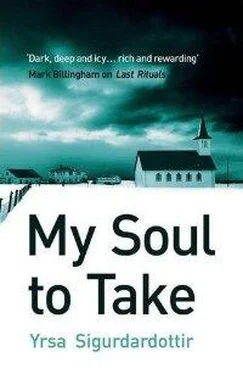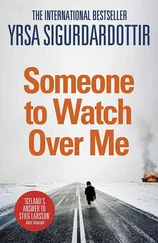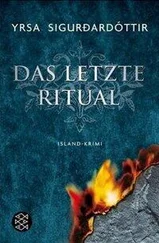Jónas sighed. It was a very uncomfortable situation. Should he allow himself to grieve? He had liked Birna despite her flaws, and if he was honest with himself, he had been rather more than fond of her, although his affection had not been reciprocated. Should he feel aggrieved? This was a major setback for his plans to expand the hotel. Should he tell the staff or act as though nothing had happened? The police hadn’t advised him either way. He had to be careful, because many people would undoubtedly scrutinize his reaction and interpret it to fit whatever stories were circulating. It was a small place and his staff were not known for their discretion. He sighed again. Perhaps the police would rule it an accident, but nothing in their behavior suggested that.
Jónas turned and went inside. He hurried past reception to avoid being stopped by anyone. His ploy worked, but it was obvious just looking at Kata, propped up against the reception desk, that she was burning to know what the police had said. The beautician opened her mouth as soon as Jónas entered the building, but when he looked down and quickened his pace, she closed it again. She and Vigdís, the receptionist, watched despondently as he rushed past without saying a word. It wouldn’t last long—in the end curiosity would get the better of them, even if they had to chase him down the corridor—but so far so good, Jónas thought, as he hurried into his office and closed the door behind him. He sat down, brooding. Maybe some good would come of this. Was there a chance that this tragedy could be spun in favor of the hotel, and Jónas himself? He picked up the telephone and dialed a number. Thóra sat sheepishly on the edge of her bed. Birna’s diary rested in her lap. She had not decided what to do with it, whether to sneak it back into Birna’s room or whether she could plant it somewhere without arousing suspicion. Should she get rid of the book immediately or wait until she had read it? Her cheeks burned when she thought that Birna might well still be alive. What had she been thinking? Was she so bored by her postbox-obsessed clients and all the other nitpickers that she was starting to make more exciting cases out of nothing? She had come here to dissuade a half-crazy hotel owner from pointless litigation, not to become embroiled in a police investigation that was none of her business. The telephone rang and she reached for it, welcoming the distraction.
“Could you pop in and see me?” Jónas said cryptically. “Something unexpected has cropped up and it might be connected with the hauntings.”
“What is it?” asked Thóra, intrigued.
“I’ll explain when you come, but I think Birna, the architect, is dead and—”
“I’ll be there in ten minutes,” Thóra interrupted him, and hung up.
Well, well. She turned from the telephone to look back at the diary. In a way she was relieved: at least she had not stolen the diary from a living person. She opened the book with her sleeve and flicked through the pages using the edge of her thumb. It was certainly an unusual diary. Instead of containing a few notes, each page was densely packed with small, tight handwriting. There were a lot of sketches of houses, buildings, and design details. Some of the sketches seemed to be rough doodles from Birna’s imagination; others looked more likely to be real-life projects. One page per day had clearly not been enough for Birna, because she had filled the pages well into September—four months ahead.
Thóra looked at the last entries, hoping to find something along the lines of “Met X on the beach—must be careful,” but no such luck. The final two-page spread said, “Bergur’s birthday—mustn’t forget. Transfer money for April,” and listed a welter of names of companies that Thóra didn’t recognize. Beside each name was a telephone number with measurements in millimeters followed by prices in krónur. At the very end of each line was a string of different abbreviations that she couldn’t fathom: “B., W., R., G., S., etc.” At the top of the page, she had written “Cladding,” underlined. Birna had apparently been seeking information about different types of cladding and had marked a cross against the line showing one of the lowest prices. Since the cladding could not be connected with the woman’s death, a rather frustrated Thóra flicked back to the preceding pages. There was a plan showing, as far as Thóra could tell, the area surrounding the hotel and the location of the new building. The main measurements and distances had been written in, and an ornate arrow pointed north. Around the drawing were comments by Birna, mainly concerning the slope of the land and light conditions, but one aroused Thóra’s interest in particular: “What’s wrong with this spot??? Old plans???” Just beneath, written with another pen, it said, “Keens,” also followed by three question marks. She was none the wiser. A detailed sketch of a swastika amid a list of everyday objects on the following page did not help. If the notebook was anything to go by, Birna had definitely not been your average woman.
Although Thóra would have liked to read the diary from cover to cover, she had to go to see Jónas. He knew she had nothing better to do, so it would be hard to explain being late. All the same, she flicked back until she found another, similar drawing. This showed the floor plan of a house, two adjacent rectangles divided up into rooms. A staircase was shown in the same place on both, so it must be a two-story house. The rooms were clearly marked: two living rooms, kitchen, study, bedroom, toilet, and so on. Various comments filled the margins, such as “Built in 1920? Rising damp in SW wall. Foundations?” Birna had also written down a question that must have been plaguing her, because she had drawn a crosshatched box around it: “Who was Kristín?” Thóra looked at the floor plan. One of the rooms on the upper floor was marked “Bedroom” like the other two, but beneath it was written in smaller letters, “Kristín?” Thóra scanned the two pages in search of any indication that the drawing showed one of the local houses, and saw that the top of the left-hand page was marked “Kreppa,” the name of one of the farms. She closed the diary and slid it inside her suitcase. The cleaners would hardly start rummaging around in there.
Jónas seemed worried, and not his usual expansive self. He offered Thóra one of the two uncomfortable seats in front of his desk, then threw himself down in an upholstered leather chair behind it. No herbal tea was offered, much to Thóra’s relief.
“What did the police want, Jónas?” Thóra asked, to break the ice.
Jónas groaned. “Does everyone know they were here?”
“Well, I can’t answer for everybody, but a lot of people know besides me. Most people know a policeman when they see one,” replied Thóra. “What did they want?”
Jónas groaned again, louder than before. From under his sleeve he pulled down a steel bracelet set with a large brown stone, which he rubbed absentmindedly as he answered her question. “They found a body on the beach, the body of a woman they believe to be Birna, the architect I told you about yesterday.” He closed his eyes, still slowly rubbing the bracelet.
“Ah,” said Thóra. “Did they mention the cause of death? There can be many reasons for people being found dead on a beach. More often than not it’s suicide.”
“I don’t think she committed suicide,” Jónas said morosely. “She wasn’t the type.”
Thóra didn’t like to point out that there was no particular type that took their own lives. “What did the police say? That’s the most important thing. Presumably they’ve visited the scene?”
Jónas tore his attention away from his bracelet and looked at Thóra. “They said nothing specific. It was more the way they acted and what they didn’t say.” He looked back at his wrist. “If she’d drowned, for example, fallen on to a rock, something that suggested an accident, they would definitely have asked me about her behavior. You know—did she do a lot of hiking? Kayaking? Swimming in the sea? But they asked me nothing. All they wanted to know was whether anything was missing from here and whether I recognized her from the very rough description they gave.” Jónas suddenly stared at Thóra. “Now that I think of it, it was extremely strange that they made no mention of her facial features. Do you suppose the head was missing?” Before Thóra could answer, he corrected himself: “No, hardly, they described the hair color.” His eyes widened. “Could it be that the killer cut the head off, scalped it, and put the hair on top of the body?”
Читать дальше












